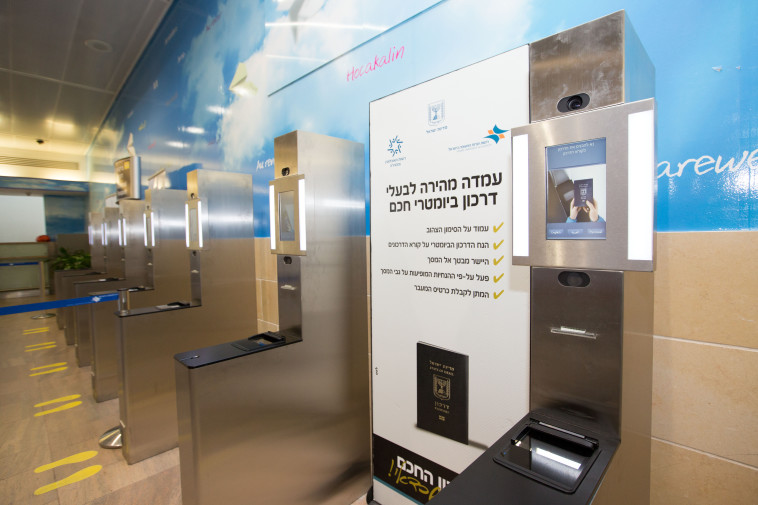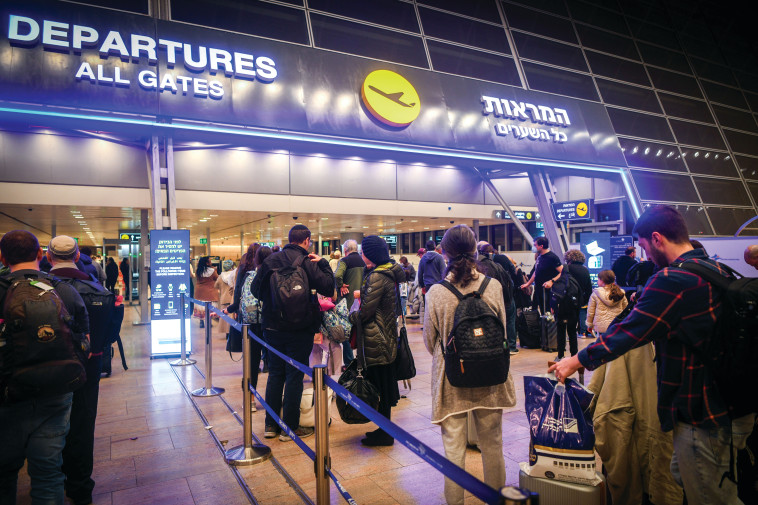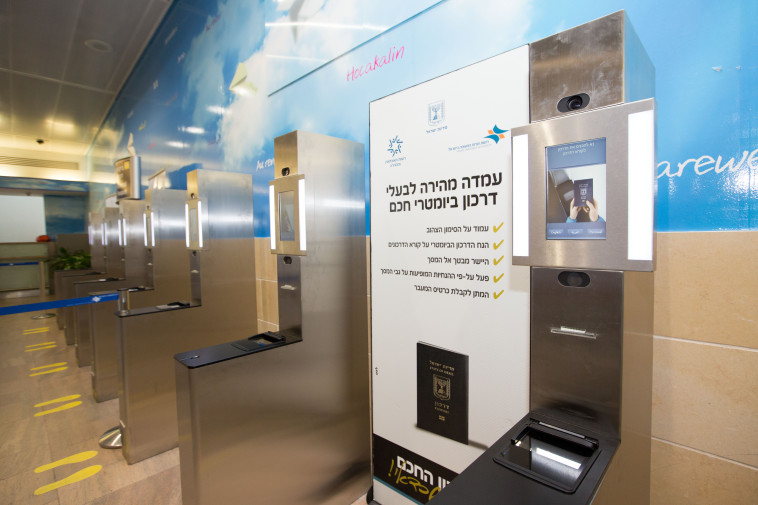State Comptroller Mattaniho Engelman published a report today (Tuesday) dealing with the issue of using biometric identification documents – identity cards and passports, from which it appears that there are substantial deficiencies in the matter. Among other things, this is a significant delay in the transition to biometric ID cards, the lack of use of smart ID cards due to legal and technological barriers, actual loopholes in the border control in the Benevolent Republic that may allow foreign and Israeli criminals and terrorists to enter and leave the country, deficiencies in maintaining biometric data in the computerized systems of the Population and Immigration Authority , and difficulty in dealing with the increase in demand for the issuance of biometric identification documents, which resulted in the formation of heavy burdens at the Population Authority and difficulties in scheduling appointments.
The auditor found that as of July 2022, there were over three million Israelis in the State of Israel who hold the old type of identity card – which is easy to forge – this despite the fact that the transition to smart identification methods began about a decade ago, and in a mandatory manner starting from the summer of 2017. As mentioned, the continued use of these cards has consequences in various aspects criminal and security. Among other things, in the first half of the year 2022, about 400 attempts to enter the country using fake identification documents were registered at the crossings that the land crossings authority believes.
Another aspect that came up in the report is the gap created during the Corona period regarding the smart passports, which stands at about one million passports relative to the volume in 2019. At the end of that year, the percentage of Israelis who held a valid passport was over 75%. As of July 2022, the percentage of Israelis holding a valid passport is about 63%, which means that as of July 2022 – about 3.2 of the passport holders still hold the old type passports.
It was also brought up that the passport factory of the Population Authority is equipped with outdated printers for issuing biometric passports, and the production dependent on them does not meet the demand for biometric passports in periods when there is an increase in demand. Although four years have passed since the Authority began the procedures to examine the purchase of advanced printers, in order to increase the number of passports produced and meet the population's demand for their supply, the process of replacing the printers in the passport issuing factory with advanced printers has not yet been completed. In addition, the Authority does not have printers at the backup site to print biometric passports in the event of the shutdown of the issuing plant. This means that there will be no ability to issue biometric passports if the issuing plant is shut down.
 Device for scanning biometric passports, archive (Photo: Miriam Elster, Flash 90)
Device for scanning biometric passports, archive (Photo: Miriam Elster, Flash 90)Alongside them, there are approximately 3.6 million Israelis who still hold old identity cards, or hold biometric cards whose validity is about to expire. The validity of these certificates – old-type certificates and biometric certificates – will expire in the next two years. Those who hold them, are expected to come to the Population Authority offices in order to issue new identification documents, this is in addition to the current inquiries.
As mentioned, this is an average monthly increase of about 150 thousand out of about 200 thousand inquiries that were on average per month in 2019 (an average monthly increase of about 75%). It emerged that the answer formulated by the authority regarding the load of inquiries expected in its bureaus in the coming years – placing self-service stations – will provide a partial answer: the stations will not provide an answer to the 3.9 million residents who, as of September 2022, do not have biometric identification documents (biometric passport or smart identity card); Also, at this stage the positions are not planned to provide service to minors with biometric identification documents.
An alarming breach
The report also states that from the documents of the Population Authority, as well as from patrols, observations and border control experience conducted by representatives of the State Comptroller's Office, gaps emerged in the conduct of the Population Authority in implementing a procedure it established with the aim of blocking a loophole that could allow foreign and Israeli elements of crime and terrorism to enter and leave the country. This is a real loophole in border control.
The document also mentioned a series of cases in which foreigners entered the country without being checked as required. These events revealed loopholes in the field of entry of foreigners into Israel because the working method of the border control of foreigners in Israel is not consistent with the guidelines of the Border Control Administration and opens the door for the entry of foreigners, without verification that there is a place to approve their entry into Israel. This report therefore reveals real loopholes in the entry of Foreigners through the National Highway.
 Passengers on the bus (Photo: Aryeh Liav Abrams, Flash 90)
Passengers on the bus (Photo: Aryeh Liav Abrams, Flash 90)Meanwhile, it emerged that in order for the National Biometric Database Authority to be able to fulfill its role – prevention of identity forgery and double purchasing – it must be equipped with a biometric comparison system. In 2017, the law stipulated that at the end of the temporary order, the biometric database will be based on facial images only and the fingerprints in it will be deleted, but it turned out that the existing biometric comparison system is not suitable for this purpose. Despite the fact that in 2020 the head of the cyber system determined that there are technological means suitable for basing the database on facial images only, it was only in December 2022 that the National Biometric Database Authority published the first stage of a tender for the purchase of a biometric comparison system suitable for this purpose. According to the Ministry of the Interior, the system is expected to be implemented towards the fourth quarter of 2024.
Also, next to the national biometric database, the Population Authority has in its information systems databases of facial images of millions of residents. Due to the technological development, the facial images are of biometric quality, and therefore the possession of the databases is not consistent with the provisions of the law. Also, the level of protection of these databases is less than that of the national biometric database. It was found that as of October 2022, approximately three years after the supervisor of the biometric applications first warned about this issue, the authority has not formulated a solution to the issue.
In view of the seriousness of the audit findings, Auditor Engelman recommends that the Population Authority act to correct the deficiencies, and that the Minister of the Interior make sure that actions are taken to correct the deficiencies in the aforementioned areas, including making sure that deficiencies in the field of security and information protection are corrected in coordination with the professional bodies entrusted with this: the Shin Bet, the police and the National Cyber Array.
In particular, the Population Authority must act in accordance with the procedure it established, the purpose of which is to respond to the weakness in the border inspection presented in the report in relation to crossing using Israeli passports. and to act in cooperation with the Shin Bet to act without delay to correct the situation described in the report, which allows unauthorized foreigners to enter Israel in Israel, and to ensure that the border control process achieves its goals.
It is also recommended that the Population Authority formulate a detailed work plan to deal with the burdens on the Authority's bureaus, based on data regarding the expected applications (including 3.6 million applications for smart identity cards instead of certificates whose validity is expected to expire in the next two years) compared to the processing capabilities of the bureaus and make sure that the planned solutions are expected to respond to requests from the public, with a sufficient level of service. In this rule, it is recommended that you try to combine the renewal dates of the two biometric identification documents – ID card and passport. This is in order to ease the future burdens and improve the service to the public in such a way that it will be necessary to come only once to renew the identification documents.






